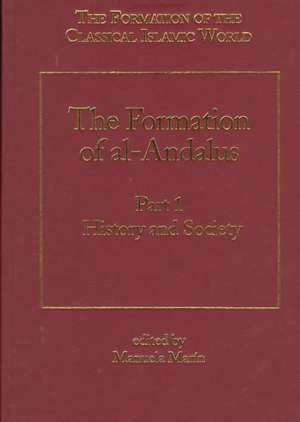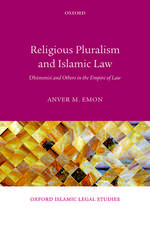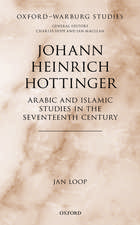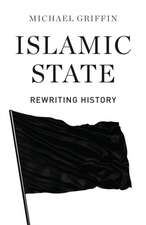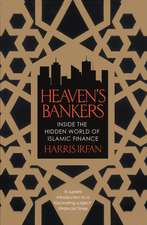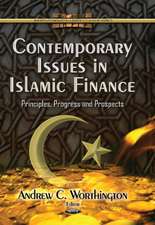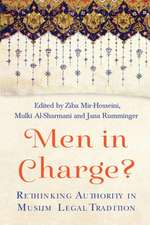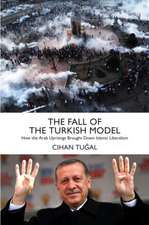The Formation of al-Andalus, Part 1: History and Society: The Formation of the Classical Islamic World
Editat de Manuela Marinen Limba Engleză Hardback – 21 dec 1998
Din seria The Formation of the Classical Islamic World
- 24%
 Preț: 330.57 lei
Preț: 330.57 lei - 26%
 Preț: 1244.72 lei
Preț: 1244.72 lei - 9%
 Preț: 1590.79 lei
Preț: 1590.79 lei - 28%
 Preț: 1585.56 lei
Preț: 1585.56 lei - 27%
 Preț: 1216.18 lei
Preț: 1216.18 lei - 25%
 Preț: 1249.21 lei
Preț: 1249.21 lei - 29%
 Preț: 1022.09 lei
Preț: 1022.09 lei - 29%
 Preț: 1300.76 lei
Preț: 1300.76 lei - 27%
 Preț: 1059.63 lei
Preț: 1059.63 lei - 28%
 Preț: 1418.71 lei
Preț: 1418.71 lei - 29%
 Preț: 1249.37 lei
Preț: 1249.37 lei - 27%
 Preț: 1051.46 lei
Preț: 1051.46 lei - 29%
 Preț: 1162.81 lei
Preț: 1162.81 lei - 25%
 Preț: 688.22 lei
Preț: 688.22 lei - 29%
 Preț: 1161.17 lei
Preț: 1161.17 lei - 28%
 Preț: 1417.98 lei
Preț: 1417.98 lei - 26%
 Preț: 1014.74 lei
Preț: 1014.74 lei - 21%
 Preț: 338.37 lei
Preț: 338.37 lei - 28%
 Preț: 1410.83 lei
Preț: 1410.83 lei - 28%
 Preț: 1383.76 lei
Preț: 1383.76 lei - 27%
 Preț: 1499.60 lei
Preț: 1499.60 lei
Preț: 1473.15 lei
Preț vechi: 2052.44 lei
-28% Nou
Puncte Express: 2210
Preț estimativ în valută:
281.88€ • 295.10$ • 233.24£
281.88€ • 295.10$ • 233.24£
Carte tipărită la comandă
Livrare economică 05-19 aprilie
Preluare comenzi: 021 569.72.76
Specificații
ISBN-13: 9780860787082
ISBN-10: 0860787087
Pagini: 552
Dimensiuni: 169 x 244 x 38 mm
Greutate: 1.18 kg
Ediția:1
Editura: Taylor & Francis
Colecția Routledge
Seria The Formation of the Classical Islamic World
Locul publicării:Oxford, United Kingdom
ISBN-10: 0860787087
Pagini: 552
Dimensiuni: 169 x 244 x 38 mm
Greutate: 1.18 kg
Ediția:1
Editura: Taylor & Francis
Colecția Routledge
Seria The Formation of the Classical Islamic World
Locul publicării:Oxford, United Kingdom
Cuprins
Contents: Introduction; The itineraries of the Muslim conquest of al-Andalus in the light of a new source: Ibn al-Shabbat, Emilio de Santiago Simón; The Muslim settlement of Spania/al-Andalus, Maria Jesús Viguera MolÃns; Al-Andalus and Gothica Sors, Heinz Halm; The social structure of al-Andalus during the Muslim occupation (711-755) and the founding of the Umayyad monarchy, Miguel Cruz Hernández; The settlement and organisation of the Syrian Junds in al-Andalus, Eduardo Manzano Moreno; An Arab among the Muwallads: Muhammad ibn ’Abd al-Salam al-Khushani, Luis Molina; The population of the region of Valencia during the first two centuries of Muslim rule, Pierre Guichard; Mozarabs: an emblematic Christian minority in Islamic al-Andalus, MÃkel de Epalza; From the Roman to the Arab: the rise of the city of Murcia, Alfonso Carmona González; From Civitas to Madina: destruction and formation of the city in south-east al-Andalus: the archaeological debate, Sonia Gutiérrez Lloret; Cities founded by the Muslims in al-Andalus, Leopoldo Torres Balbás; Four questions in connection with Ibn Hafsun, Maribel Fierro; From the Sikkat al-Andalus to the mint of Madinat al-Zahra’, Alberto Canto GarcÃa; Settlement and fortification in southern al-Andalus: the formation of a land of Husun, Manuel Acién Almansa; Considerations with respect to Al-Thaghr in al-Andalus and the political-administrative division of Muslim Spain, Jacinto Bosch Vilá; The zalmedina of Córdoba, Joaquin Vallvé Bermejo; The manifest caliph: Umayyad ceremony in Córdoba, or the staging of power, Miquel Barceló; Eastern influences in al-Andalus, Juan Zozaya; The structure of the family in al-Andalus, MarÃa Luisa Ãvila; Index.
Recenzii
’The two volumes of The Formation of Al-Andalus provide a great service by introducing the serious student of al-Andalus to a large number of the Spanish (and French) scholars in different fields....’ International Journal of Middle East Studies
Notă biografică
Sætnan, Ann Rudinow; Schneider, Ingrid; Green, Nicola
Descriere
The two volumes of The Formation of al-Andalus present a conspectus of current research on the history and culture of early medieval Spain and Portugal, from the time of the Arab conquest in 711 up to the fall of the caliphate. They trace the impact of Islamisation on the pre-existing Roman and Visigothic political and social structures, the continuing interaction between Christian and Muslim, and describe the particular development and characteristics of Muslim Spain- al-Andalus. Together, they comprise 38 articles, of which 32 have been translated into English specially for this publication. The first volume focuses on political and social history, and looks in detail at settlement patterns and urbanisation; the second examines questions of language and covers the brilliant cultural and intellectual history of the period.
